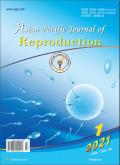L–arginine alleviates postmenopausal complications in female rats by stimulating ovarian dopamine beta hydroxylase
IF 0.6
Q4 REPRODUCTIVE BIOLOGY
引用次数: 0
Abstract
Objective: To evaluate the levels of estrogen, albumin and gonadotropins (luteinizing hormone, follicle-stimulating hormone) as well as the activity of dopamine beta hydroxylase (DAß H) in aged female rats treated with nitric oxide precursor L-arginine and neuronal nitric oxide synthase antagonist L-NAME. Methods: A total of 224 Wistar rats (36 weeks old, weighing 250 g) based on a random sampling were divided into the control and experimental groups after Pap smear test. The control group received only saline (1 mL/kg) intraperitoneally (i.p.). The experiential groups were treated with L-arginine (5, 25 and 50 mg/kg, i.p.) and L-NAME (5 and 25 mg/kg, i.p.) for 3 to 21 days, once a day. Blood samples were taken from the rats and the levels of estrogen and albumin and gonadotropins in the serum were monitored by enzyme-linked immunosorbent assay kit, and the ovaries were examined immunohistopathologically for DAßH activity. Results: L-arginine (5 mg/kg) significantly increased estrogen level (P<0.05), which was associated with DAßH activation in the ovaries. L-NAME reduced this effect when administered prior to L-arginine dose. L-arginine caused no significant change in the levels of luteinizing hormone and follicle-stimulating hormone. Except for the lowest dose of L-arginine in the shortest period, albumin levels significantly decreased in other treatments compared to the control group (P<0.05). Conclusions: L-arginine is likely to reduce postmenopausal problems due to an increased nitric oxide level.L-精氨酸通过刺激卵巢多巴胺β-羟化酶减轻雌性大鼠绝经后并发症
目的:评价一氧化氮前体L-精氨酸和神经元型一氧化氮合酶拮抗剂L-NAME对老年雌性大鼠雌激素、白蛋白和促性腺激素(促黄体生成素、卵泡刺激素)水平以及多巴胺β-羟化酶(DAßH)活性的影响。方法:随机抽取224只Wistar大鼠(36周龄,体重250g),经巴氏涂片检查后分为对照组和实验组。对照组仅腹膜内注射生理盐水(1mL/kg)。经验组用L-精氨酸(5、25和50mg/kg,腹膜内注射)和L-NAME(5和25mg/kg,腹膜外注射)治疗3至21天,每天一次。从大鼠身上采集血样,通过酶联免疫吸附测定试剂盒监测血清中雌激素、白蛋白和促性腺激素的水平,并对卵巢进行免疫组织病理学检查DAßH活性。结果:L-精氨酸(5mg/kg)可显著提高卵巢雌激素水平(P<0.05),这与卵巢DAßH的激活有关。L-NAME在L-精氨酸给药前降低了这种作用。L-精氨酸对促黄体生成素和卵泡刺激素的水平没有显著变化。与对照组相比,除在最短时间内给予最低剂量的L-精氨酸外,其他治疗组的白蛋白水平均显著降低(P<0.05)。
本文章由计算机程序翻译,如有差异,请以英文原文为准。
求助全文
约1分钟内获得全文
求助全文
来源期刊

Asian Pacific Journal of Reproduction
Veterinary-Veterinary (all)
CiteScore
1.70
自引率
0.00%
发文量
588
审稿时长
9 weeks
期刊介绍:
The journal will cover technical and clinical studies related to health, ethical and social issues in field of Gynecology and Obstetrics. Articles with clinical interest and implications will be given preference.
 求助内容:
求助内容: 应助结果提醒方式:
应助结果提醒方式:


